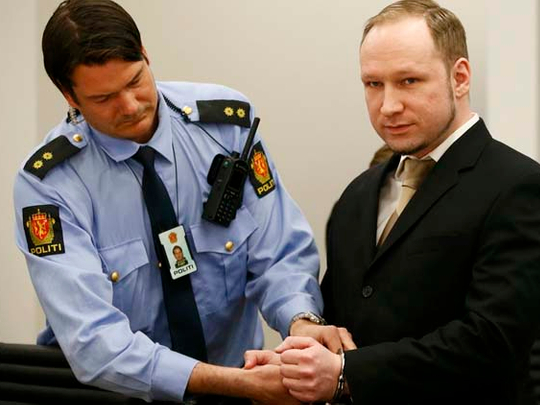
So, in the end, Anders Behring Breivik was judged sane and received a sentence of 21 years. Someone who killed a total of 77 people seems to be stretching the definition of sane. However, the Norwegian court has made its decision.
Now I wonder if it would be possible for the rest of us to conduct ourselves in a sane manner regarding Breivik and others like him. Could a tragedy like this do something to sate the public appetite for the types of murderers, who, in turn, thrive on infamy and attention?
Since the massacre last July, we’ve been learning lots about Breivik: his hatred for multiculturalism; his pose as a political martyr; that he intends to write the modern-day version of Mein Kampf from his prison cell. I resent the fact that Breivik is in my head, in a way his victims aren’t.
Had Breivik killed fewer people, it’s still probable that their names would have far less resonance than his own. This seems to be the way with such crimes. In a final insult to the victims, killers such as Breivik get to feast on their own notoriety. What we should ask ourselves is to what extent we are enabling them?
Motives for homicide are complex, but it seems accepted that a certain type of killer craves respect and validation. Massacres and serial killing sprees almost appear to be career options for twisted narcissists with no way other way to get noticed, and make their mark. However, murderers only maintain their grip on the public imagination because ordinary people can’t get enough of them.
What can’t help is the huge market in what could be termed homicide entertainment. Television, books, cinema, internet, media, all stuffed with real crime “homi-entertainment” superstars, who, living or dead, can always draw a titillated crowd. The likes of Brady and Hindley, Fred West, Raoul Moat, Michael Ryan, the list sprawls on and, presumably, includes Breivik.
The culmination of Breivik’s trial became yet more poignant, with news of another lone gunman at the Empire State Building. Back in Britain, Winnie Johnson, mother of Moors’ victim Keith Bennett, died, with Ian Brady still taunting her about the whereabouts of her son’s grave to the end.
Who gave Brady the power to do this? In a way, we all did, just by being interested in him. By showering Brady with negative attention, we colluded with his sick fantasies of enduring notoriety and power.
Maybe this fascination with the worst homicidal maniacs is just a facet of human nature we must accept — an unavoidable ugliness. Murders aren’t going to stop; neither will the need to report them. Nor is it wrong for people to be shocked by violent crime or desire answers.
However, if it’s a given that some people kill for attention, then couldn’t there be an attempt to curb the salacious homicide entertainment industry? Just something as simple as imposing an embargo for a set amount of time banning all murder exploitation books, documentaries and movies, until the initial interest dies down.
The victims’ families are one thing, but what information do the rest of us truly need about a mass murderer apart from “he’s still locked up?” What seems galling is the thought that this is just the start of at least 21 years of being bombarded with sensationalist tripe about Breivik, as he laps up the attention, while smugly typing up ‘Mein Kampf 2’ in his cell. I’d prefer to think of him fading into the obscurity he deserves, left to the prison staff and shrinks to sort out.
If an embargo is wistful thinking, perhaps some of us could stage a quiet protest by refusing to engage in Breivik’s “big moment”, by refusing to read, watch or listen to anything to do with him. If enough of us refuse to buy into yet another mind of a murderer cult, then at least our own sanity wouldn’t be in doubt.












